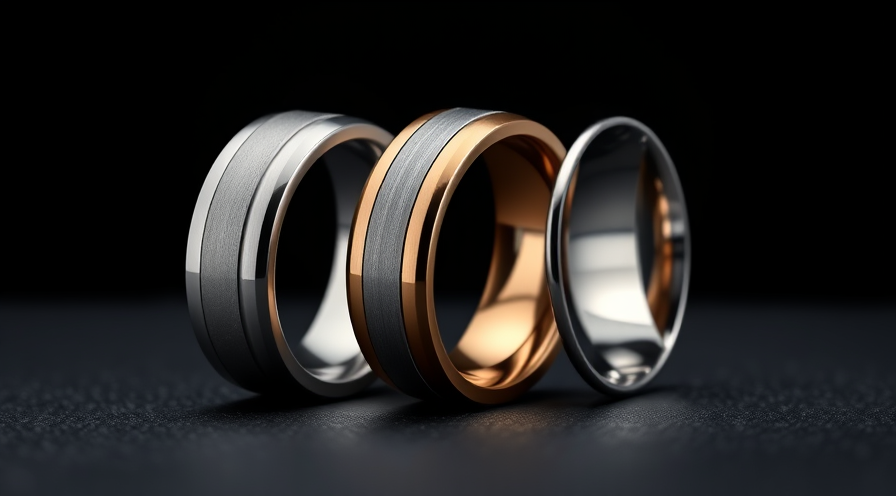Men’s Wedding Bands: Titanium vs. Tungsten vs. Cobalt
Men’s wedding bands are more than just symbols of commitment; they are enduring pieces of craftsmanship that reflect personal style, lifestyle, and values. Among the most popular choices for durable and stylish metals are titanium, tungsten, and cobalt. Each offers unique characteristics that cater to different preferences and budgets. This article explores the strengths, weaknesses, and distinctive qualities of these metals to help grooms-to-be make an informed decision about their wedding band.
Why Choosing the Right Metal Matters
Selecting the right metal for a men’s wedding band involves balancing aesthetics, durability, comfort, and cost. The metal not only influences the look and feel of the ring but also its longevity and maintenance requirements. Metals like titanium, tungsten, and cobalt are favored due to their resilience and modern appeal, making them increasingly popular alternatives to traditional gold or platinum bands.
Titanium: The Lightweight Powerhouse
Durability and Strength
Titanium is renowned for its high strength-to-weight ratio. It is exceptionally strong yet lightweight, making it comfortable for daily wear. Resistant to corrosion and scratching, titanium wedding bands maintain their finish longer than many traditional metals. This makes titanium an excellent choice for men with active lifestyles or those working with their hands.
Design and Comfort
Titanium rings offer a sleek, modern look with a natural grayish hue, though anodizing techniques allow for a variety of colors. The metal’s lightness enhances comfort, especially for those unaccustomed to wearing rings. While titanium is scratch-resistant, it can be polished to restore its original shine if scuffed.
Considerations
- Titanium cannot be resized easily due to its hardness.
- Hypoallergenic properties make it ideal for men with sensitive skin.
- Typically more affordable than precious metals like gold or platinum.
Tungsten: The Ultra-Hard Contender
Exceptional Hardness and Scratch Resistance
Tungsten carbide is one of the hardest metals used in jewelry, ranking close to diamonds in scratch resistance. This remarkable durability helps tungsten wedding bands maintain a polished, new appearance for years. It is nearly impossible to scratch or bend a tungsten ring under normal wear conditions.
Aesthetic and Weight
Tungsten offers a distinctive, bold metallic shine with a natural gunmetal gray to black color. Unlike titanium, tungsten rings are heavier, giving a substantial feel that some men appreciate as a sign of quality. Its weight and density make it less comfortable than titanium for some wearers.
Limitations and Care
- Tungsten rings are brittle; they can crack or shatter if dropped on a hard surface.
- Tungsten cannot be resized, so accurate sizing at purchase is critical.
- Hypoallergenic and low maintenance, requiring only occasional cleaning.
Cobalt: The Balanced Metal
Strength and Durability
Cobalt chrome combines many benefits of titanium and tungsten. It is highly durable, resistant to scratching, and more impact-resistant than tungsten, reducing the risk of cracking. This metal offers an excellent middle ground for men seeking toughness without the brittleness of tungsten.
Visual Appeal
Cobalt wedding bands shine brighter than titanium and feature a naturally bright white-metallic luster similar to platinum or white gold. This makes cobalt an attractive option for men who want the look of precious metals without the price.
Comfort and Maintenance
- Cobalt is moderately lightweight, offering more comfort than tungsten but more heft than titanium.
- It is scratch-resistant but can be polished to remove surface blemishes.
- Hypoallergenic and safe for sensitive skin.
- Unlike tungsten, cobalt rings can often be resized by a skilled jeweler.
Comparing Titanium, Tungsten, and Cobalt: Key Takeaways
- Durability: Tungsten is the hardest but brittle; cobalt offers balanced toughness; titanium is strong yet more ductile.
- Weight: Titanium is the lightest, cobalt moderately weighted, tungsten the heaviest.
- Look: Titanium has a matte gray appearance; tungsten is a darker gray with metallic shine; cobalt closely resembles bright white metals.
- Resizing: Only cobalt and titanium offer limited resizing options; tungsten generally cannot be resized.
- Cost: Titanium tends to be the most budget-friendly, cobalt moderately priced, tungsten sometimes at a premium depending on craftsmanship.
Final Thoughts on Choosing the Perfect Men’s Wedding Band
When selecting between titanium, tungsten, and cobalt for a men’s wedding band, preferences for durability, weight, appearance, and maintenance will play pivotal roles. Titanium suits those wanting lightweight comfort and excellent strength. Tungsten appeals to grooms prioritizing unmatched scratch resistance and a solid feel. Cobalt serves as an ideal compromise, offering shine, resilience, and scalability in sizing.
Ultimately, the perfect wedding band is one that aligns with the wearer’s lifestyle and personal style. Men are encouraged to consider each metal’s properties carefully, try on sample bands, and consult with reputable jewelers to ensure the final choice is a lifetime symbol of their commitment. Exploring each metal’s unique qualities not only ensures satisfaction but also elevates the significance of this timeless accessory.
